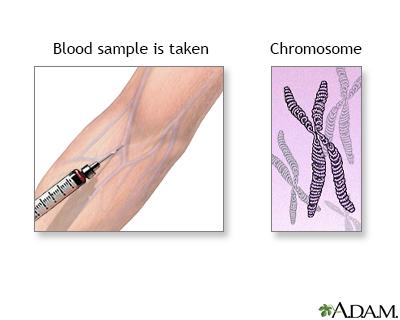Klinefelter syndrome
Definition
Klinefelter syndrome is a genetic condition that occurs in males when they have an extra X chromosome.
Alternative Names
47 X-X-Y syndrome; XXY syndrome; XXY trisomy; 47,XXY/46,XY; Mosaic syndrome; Poly-X Klinefelter syndrome
Causes
Most people have 46 chromosomes. Chromosomes contain all of your genes and DNA, the building blocks of the body. The 2 sex chromosomes (X and Y) determine if you become a boy or a girl. Girls normally have 2 X chromosomes. Boys normally have 1 X and 1 Y chromosome.
Klinefelter syndrome results when a boy is born with at least 1 extra X chromosome. This is written as XXY.
Klinefelter syndrome occurs in about 1 out of 500 to 1,000 baby boys. Women who get pregnant after age 35 are slightly more likely to have a boy with this syndrome than younger women.
Symptoms
Infertility is the most common symptom of Klinefelter syndrome.
Symptoms may include any of the following:
- Abnormal body proportions (long legs, short trunk, shoulder equal to hip size)
- Abnormally large breasts (gynecomastia)
- Infertility
- Sexual problems
- Less than normal amount of pubic, armpit, and facial hair
- Small, firm testicles
- Tall height
- Small penis size
Exams and Tests
Klinefelter syndrome may first be diagnosed when a man comes to the health care provider because of infertility. The following tests may be performed:
- Karyotyping (checks the chromosomes)
- Semen count
Blood tests will be done to check hormone levels, including:
Treatment
Testosterone therapy may be prescribed. This can help:
- Grow body hair
- Improve appearance of muscles
- Improve concentration
- Improve mood and self esteem
- Increase energy and sex drive
- Increase strength
Most men with this syndrome are not able to get a woman pregnant. An infertility specialist may be able to help. Seeing a doctor called an endocrinologist may also be helpful.
Support Groups
These sources can provide more information on Klinefelter syndrome:
- Association for X and Y Chromosome Variations -- genetic.org
- US National Library of Medicine, MedlinePlus -- medlineplus.gov/klinefeltersyndrome.html
Possible Complications
Enlarged teeth with a thinning surface is very common in Klinefelter syndrome. This is called taurodontism. This can be seen on dental x-rays.
Klinefelter syndrome also increases the risk of:
- Attention deficient hyperactivity disorder (ADHD)
- Autoimmune disorders, such as lupus, rheumatoid arthritis, and Sjögren syndrome
- Breast cancer in men
- Depression
- Learning disabilities, including dyslexia, which affects reading
- A rare type of tumor called an extragonadal germ cell tumor
- Lung disease
- Osteoporosis
- Varicose veins
When to Contact a Medical Professional
Contact your provider if your son does not develop secondary sexual characteristics at puberty. This includes facial hair growth and a deepening of the voice.
A genetics counselor can provide information about this condition and direct you to support groups in your area.
Gallery

References
Allan CA, McLachlan RI. Androgen deficiency disorders. In: Jameson JL, De Groot LJ, de Kretser DM, et al, eds. Endocrinology: Adult and Pediatric. 7th ed. Philadelphia, PA: Elsevier Saunders; 2016:chap 139.
Jones KL, Jones MC, Campo MD. Recognizable patterns of malformation. In: Jones KL, Jones MC, Campo MD, eds. Smith's Recognizable Patterns of Human Malformation. 8th ed. Philadelphia, PA: Elsevier; 2022:chap 1.
Matsumoto AM, Anawalt BD, Testicular disorders. In: Melmed S, Auchus RJ, Goldfine AB, Koenig RJ, Rosen CJ, eds. Williams Textbook of Endocrinology. 14th ed. Philadelphia, PA: Elsevier; 2020:chap 19.
Nussbaum RL, McInnes RR, Willard HF. The chromosomal and genomic basis of disease: disorders of the autosomes and sex chromosomes. In: Nussbaum RL, McInnes RR, Willard HF, eds. Thompson & Thompson Genetics in Medicine. 8th ed. Philadelphia, PA: Elsevier; 2016:chap 6.